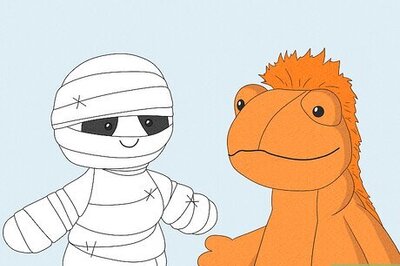
views
Shortness of Breath May Be from Anxiety if…
...it’s accompanied by other symptoms of anxiety. If your shortness of breath occurs alongside other common signs of anxiety or a panic attack, it’s likely the situation isn’t caused by an urgent medical situation. Observe if you’re experiencing any of these other symptoms of anxiety: Uncontrollable worry Nervousness Irritability Sweating Trembling Fast heart rate Body tingling or numbness Dizziness, chest pain, or lightheadedness (but know that these may also be symptoms of more serious conditions)
...you experience it during a stressful situation. If you experience difficulty breathing during or immediately following an anxiety-inducing situation—say you almost got hit by a car or you had an unexpected interaction with your ex—it’s safe to assume your shortness of breath is connected to that.
...it goes away with relaxation techniques. Practicing calming and grounding techniques can help alleviate shortness of breath associated with anxiety. If you try grounding tactics—such as counting everything red in the room, breathing into a paper bag, or counting your intakes of breath—and your breath returns to you, it’s likely it was caused by anxiety and not something more urgent.
...it doesn’t last longer than 20 minutes. If shortness of breath lasts less than about 20 minutes or so, there’s a good chance it was triggered by anxiety. Most panic attacks last between 5 and 20 minutes. On the other hand, shortness of breath that’s a result of something more serious—like a heart condition or asthma attack—will probably last much longer.
How to Stop Anxiety-Induced Shortness of Breath
Remind yourself there is no emergency. "Recognize that anxiety is a natural state," Janelli says. "We all have it, it happens. Change only happens when you can first have an awareness of what's going on." Once you’ve ruled out the possibility that your shortness of breath is due to an urgent medical situation, you may be able to calm yourself by remembering that the shortness of breath will pass. Reassuring yourself that the problem is anxiety-related and that it’s only temporary can help you regain your breath more easily. This isn’t to say what you’re going through isn’t a big deal; rather, it can help calm you down to remember that though anxiety and panic attacks are scary and uncomfortable, they aren’t life-threatening and are usually short-lived.
Practice grounding techniques. Janelli stresses that "focus[ing] on getting back into your body" and "focus[ing] on the breath" can help people get past an anxiety attack. Learning calming rituals and grounding techniques and having them in your back pocket can help you to combat anxiety-induced shortness of breath when it happens. Try these proven relaxation techniques: 333 grounding technique: Identify 3 things you can see, then identify 3 things you can hear, then move 3 parts of your body. Focusing on your senses and your surroundings will help you feel more present and tethered to your environment. Count everything red around you: Observing everything red (or another color) in your immediate environment can help you feel more connected and in tune with your surroundings. Repeating a calming mantra: Reciting the same mantra to yourself over and over (in your head or aloud) can help you bring focus away from the trigger of your anxiety. Breathing through your nose: Nose breathing has been known to help regulate your breath and help it return to normal. Counting with each intake of breath: Counting each breath may help you draw focus away from your anxiety and towards your breath, helping you find your grounding and calm down.
Breathe into a paper bag. Breathing into a paper bag can help regulate your breath and let it return to normal. It will return carbon dioxide back into your body, thus helping to balance the flow of oxygen.
Move your body. A little exercise can go a long way towards alleviating anxiety. If you’re suffering shortness of breath, you may not want to run a mile, but a short walk—especially out in the fresh air and/or away from the situation triggering your anxiety—can help you feel more grounded and regain focus. Even stretching can help you draw focus to your body and your physical surroundings, which may alleviate anxiety and help your breath return to normal.
Be aware of what triggers your anxiety. Identifying the source of your anxiety in the moment can help you confront it or avoid it, which can help you overcome your panic attack. As Janelli says, "The more that you can be aware of what your triggers are, the more in control and empowered you can be." Once you've identified what's causing your anxiety, you can "make the choice to decide what you want to do about it," Janelli says: do you want to address the situation, or avoid it? "That's where the power comes in." Seeing a therapist (especially, Janelli says, one who specializes in cognitive-behavioral therapy) can help you develop coping mechanisms to face you anxieties and overcome them.
When to Go to the Doctor for Shortness of Breath
See a doctor if you have other signs of more serious medical conditions. If your shortness of breath is accompanied by other symptoms of serious and urgent medical conditions, call a doctor or go to the hospital to seek medical attention. Look for these symptoms of other serious medical conditions: Persistent difficulty breathing Pain in your arm, neck, or shoulder Chest pain or chest tightness Lightheadedness/fainting Nausea Blue tinge to your lips or nails Coughing or wheezing Vomiting Confusion Fever Swelling in your feet and ankles Trouble breathing when you lie flat Worsening of preexisting shortness of breath
Other Conditions that Cause Shortness of Breath
There are a number of conditions characterized by difficulty breathing. Anxiety is one of a number of conditions that may cause shortness or breath or difficulty breathing, but it doesn't typically require a trip to the ER, thankfully. However, there are a number of other medical conditions characterized by shortness of breath, and they range from less urgent to more serious. They include: Obesity Allergies Heart conditions such as heart disease or a heart attack Lung-related conditions, like asthma or COPD (Chronic Obstructive Pulmonary Disease) Certain illnesses, such as Covid-19, pneumonia, or tuberculosis
















Comments
0 comment